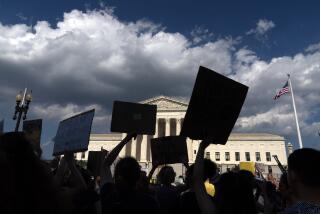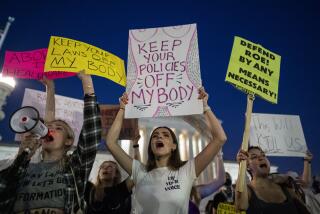Most Think Privacy Right Is in Constitution, Poll Finds
WASHINGTON — Most Americans believe the U.S. Constitution gives them a right to privacy in their personal lives that shields them from government interference in such things as the sex acts of adult homosexuals and a family’s decision to end life support for a hopelessly ill relative, according to a survey on the Supreme Court and the Constitution released Sunday.
The notion of a constitutional right to privacy is so firmly entrenched that a majority of those surveyed asserted--incorrectly--that the right is written into the Constitution.
While the word “privacy” does not appear in the Bill of Rights or anywhere else in the Constitution, a majority of the Supreme Court has concluded that the “right to liberty” in the 14th Amendment implies a right to privacy in matters such as birth control and abortion.
But this conclusion remains a subject of continuing dispute between the court’s conservative and liberal factions.
The liberals say the general rights set forth in the Constitution should be interpreted broadly to protect individuals from the government. But the conservatives maintain that the court should not create unwritten constitutional rights so as to strike down laws enacted by the majority.
This dispute flares anew with each abortion case to come before the high court. It also figures prominently in the battles over drug testing and the “right to die.”
The survey responses suggest that the public finds the right to privacy as tricky and troublesome as has the high court.
Although 73% of those surveyed say the Constitution guarantees a right to privacy, a solid majority said this right does not allow employees to refuse drug tests, nor does it give teen-age girls the right to get an abortion without their parents’ knowledge.
The survey of 805 adults was conducted for the National Law Journal and LEXIS, the computerized legal research service, and was intended to mark the 200th anniversary of the Supreme Court.
It found that most Americans could not name a single member of the Supreme Court, nor even how many members of the court there are. The respondents also said--incorrectly--that last year’s abortion ruling from the high court allowed states to make abortion illegal. The 5-4 ruling in June said states may prevent their employees from aiding abortion, but women retain the right to terminate a pregnancy.
Nearly six in 10 of those surveyed drew a blank when asked to name a sitting justice. Justice Sandra Day O’Connor, the court’s only woman, was by far the best known of the nine justices. Most of those questioned disagreed sharply with the court’s recent decisions on flag burning, civil rights and homosexuality.
--Only 40% agreed with the court’s 5-4 ruling last year that flag burning was protected as free speech. About 46% disagreed with the decision, and in a separate response, 63% favored a constitutional amendment to prohibit flag burning.
--Only 31% said the court has “gone as far as it should” to protect victims of discrimination, while 53% said the court has “not gone far enough.” In a series of 5-4 rulings last year, the court narrowed the scope of federal civil rights laws.
--About 66% said the right to privacy “protects private, voluntary acts of homosexuals,” while 26% disagreed. In 1986, the court ruled 5 to 4 that states may criminalize private homosexual behavior.
However, the public agreed with the court majority on drug testing. Only 34% said the right to privacy prohibits random drug testing of employees. Last year, the court voted 5 to 4 to uphold drug testing for public employees in jobs involving safety or sensitive information.
When asked who should decide whether to “end artificial life support” if you lapse into a coma, 88% said “your family.” In a pending dispute between a Missouri family and state officials, the court must decide whether the parents of a comatose woman can decide on their own to stop feeding her.
More to Read
Sign up for Essential California
The most important California stories and recommendations in your inbox every morning.
You may occasionally receive promotional content from the Los Angeles Times.











